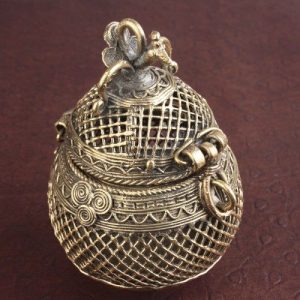I SAW him from the corner of my eye while browsing the 12-year-old artifacts store. I assumed he was a customer like me. But as I turned, I saw that he was standing by, unmindful of the display, and instead taking out chocolate biscuits from his pockets. He caught my stare, smiled, and pointed to one of the two tribal shop attendants: ”I usually get stuff like this for him. He loves all things sweet.”
As both of us assumed friendly interaction as a possibility, I heard the story of this famous tribal entrepreneurship store in Jamshedpur, Biponi. It is not an incidental story, in fact, it’s rather pertinent at this time of the year, when purchase officers and HR departments are feeling harrowed, finalising festival gifts for employees.
If you are a bank, you already know what I expect. If you are a corporate, allow me to urge you to give these ancient crafts some space in your festival season budget.”]
Mr. Amitava Ghosh, 55, a banker by profession, is a dedicated mentor to the 22 women’s tribal Self-Help Groups (SHG) in remote Jharkhand forest-villages. These groups design and produce 34 different kinds of crafts for Biponi, which they themselves run. This has been Mr. Ghosh’s passion project for 17 years — the revival and preservation of ancient crafts, and in the process giving people livelihoods. In the flagship artisans’ villages of this initiative, Amadubi and Janumdih, Ghosh had introduced village tourism that showcases the arts, crafts, foods, lifestyles and folk culture of the region. Expectedly, it is a big draw for foreign travellers.
With Biponi, Ghosh has firmed up village economies, reduced their dependence on moneylenders and mitigated alcoholism, which finds easy prey in the unemployed. He earns nothing from it, except the trust and goodwill of the tribals and their willingness to participate in his vision.

Like every entrepreneurial vision, his too is subject to market forces. In standard banking practice, a credit cycle lasts 90 days. These artisans can, in theory, avail of it and scale up. In reality, the possibility is more remote than their villages. Arts and crafts initiatives in micro, small and medium production sectors have a production cycle of 120 to 270 days — nothing a traditional bank is interested in. Equally, Biponi does not want to be overtly dependent on conditional funding, which, if suddenly withdrawn, will crush the initiative. Hence, these artisans’ ability to buy raw materials remains limited, as does their output.
The initiative survives owing to its loyal clientele, which includes Tata Motors and XLRI. Biponi’s lead product is Dokra art, which is creatred using a method that dates back over 5,000 years to the Indus Valley Civilization. Known as the Lost Wax process, it makes sculptures in brass and bell metal in wax moulds. Almost equally ancient is the source of the sensual Paitkar paintings on scrolls of bark.
The women of Biponi may not see a scale-up in the near future, but that doesn’t stop them from going forth boldly. They now plan to launch a range of oils and essences from non-timber forest produce like mahua, piyal, kusum and chireta — names that evoke the smells and sounds of their ancient forests.
Hope dies last. So I will hold forth risking raised eyebrows. If you are a bank, and you have read thus far, you already know what I expect. If you are a corporate, allow me to urge you to give these utilitarian, ancient crafts some space in your festival season budget. It would go miles for our tribal collectives, losing land, voice and creativity, fighting the Goliath of modern economy, without the slingshot of David.
This space brings you stories about the biggest and the best in the realm of grassroots innovations, and how they can change the face of wp. Write in to deepaadhikari@pipilikaenviro.in or editor@thewpjournal.in for business queries, clarifications and feedback

